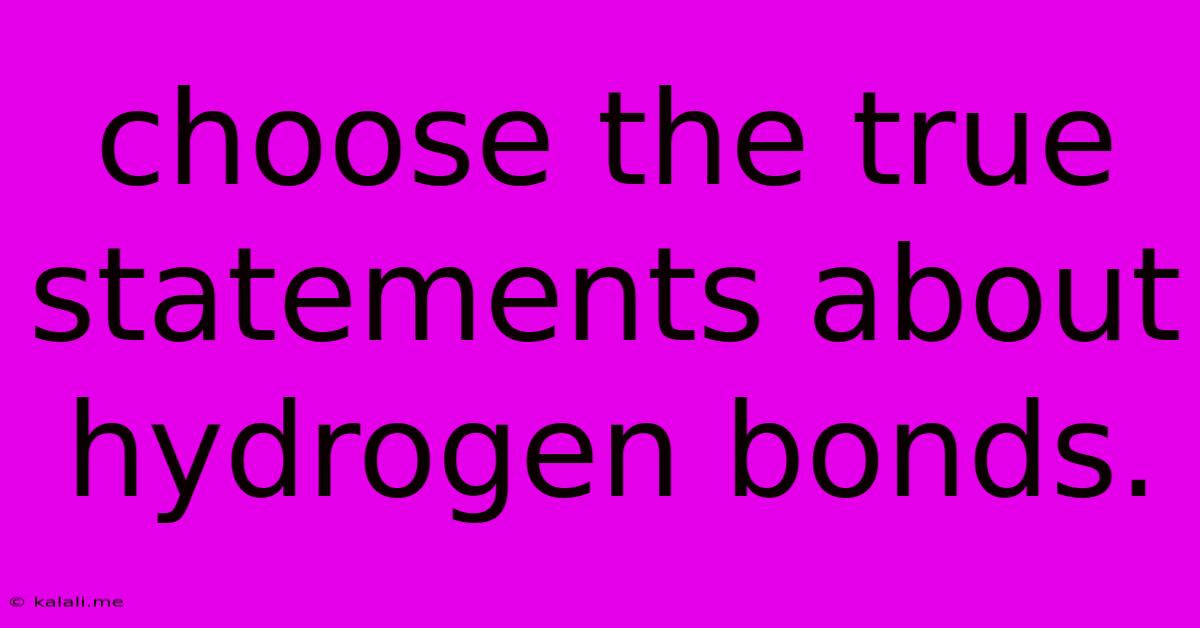Choose The True Statements About Hydrogen Bonds.
Kalali
Jun 14, 2025 · 3 min read

Table of Contents
Choose the True Statements About Hydrogen Bonds: A Deep Dive
Hydrogen bonds are a crucial aspect of chemistry, influencing the properties of countless molecules and playing a vital role in biological systems. Understanding their characteristics is key to grasping many scientific concepts. This article will explore the nature of hydrogen bonds and clarify common misconceptions, helping you choose the truly accurate statements about them.
What are Hydrogen Bonds?
Hydrogen bonds are a special type of dipole-dipole attraction between molecules, not a true chemical bond like covalent or ionic bonds. They occur when a hydrogen atom bonded to a highly electronegative atom (like oxygen, nitrogen, or fluorine) is attracted to another electronegative atom in a different molecule. This electronegativity difference creates a significant partial positive charge (δ+) on the hydrogen atom and a partial negative charge (δ-) on the electronegative atom. This electrostatic attraction forms the hydrogen bond. Think of it as a relatively weak but significant attractive force between molecules.
True Statements About Hydrogen Bonds:
Here are several true statements about hydrogen bonds, along with explanations to solidify your understanding:
-
Hydrogen bonds are relatively weak compared to covalent bonds: This is crucial. While significant in their collective effect, individual hydrogen bonds are weaker than covalent bonds. This explains why they're easily broken and reformed, a property vital for biological processes.
-
Hydrogen bonds are responsible for many of water's unique properties: Water's high boiling point, surface tension, and ability to act as a solvent are all largely due to the extensive hydrogen bonding network between water molecules. The strong intermolecular forces created by hydrogen bonding significantly impact water’s physical properties.
-
Hydrogen bonds involve a hydrogen atom bonded to a highly electronegative atom: The electronegativity difference is paramount. The hydrogen atom must be bonded to a highly electronegative atom (like oxygen, nitrogen, or fluorine) to create the significant partial charge necessary for hydrogen bond formation. This is why hydrogen bonds are not observed with carbon-hydrogen bonds, for example.
-
Hydrogen bonds influence the secondary, tertiary, and quaternary structures of proteins: The folding and overall 3D structure of proteins are significantly shaped by hydrogen bonds between amino acid residues. These bonds help stabilize the protein's conformation and are essential for its function. This includes alpha-helices and beta-sheets (secondary structure) as well as the overall protein folding (tertiary structure) and interactions between protein subunits (quaternary structure).
-
Hydrogen bonds are important in DNA structure: The double helix structure of DNA is stabilized by hydrogen bonds between complementary base pairs (adenine with thymine, and guanine with cytosine). The specificity of these base pairings, enabled by hydrogen bonds, is fundamental to DNA replication and genetic information transfer.
False Statements (Common Misconceptions):
To further clarify, let's address some common misconceptions:
-
Hydrogen bonds are covalent bonds: This is incorrect. They are intermolecular forces, not intramolecular bonds like covalent bonds.
-
Hydrogen bonds only occur in water: While prominent in water, hydrogen bonds occur in many other molecules containing N-H, O-H, and F-H bonds. This includes numerous biological molecules and organic compounds.
-
Hydrogen bonds are stronger than ionic bonds: This is generally false. While the strength varies depending on the environment, ionic bonds are typically stronger than hydrogen bonds.
By understanding these true and false statements, you can confidently navigate discussions and problems involving hydrogen bonds. Remember their importance in influencing the properties of molecules and their critical role in biological processes. This knowledge forms a strong foundation for further exploration in chemistry and related fields.
Latest Posts
Latest Posts
-
Which Of The Following Statements Is True Of Globalization
Jun 14, 2025
-
What Is The Lcm Of 4 6 And 8
Jun 14, 2025
-
How Many Diagonals In A Octagon
Jun 14, 2025
-
What Is The Factor Of 68
Jun 14, 2025
-
Which Of The Following Is Not A Microprocessor Manufacturing Company
Jun 14, 2025
Related Post
Thank you for visiting our website which covers about Choose The True Statements About Hydrogen Bonds. . We hope the information provided has been useful to you. Feel free to contact us if you have any questions or need further assistance. See you next time and don't miss to bookmark.